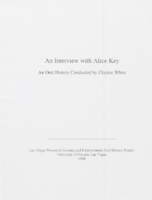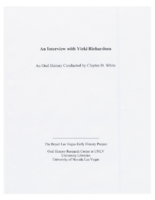Search the Special Collections and Archives Portal
Search Results

Transcript of interview with Q.B Bush by Claytee D. White, May 15, 2007
Date
Archival Collection
Description
Q.B. was one of the first black dealers on the LV Strip. Talks of the Economic Opportunity Board, the LV black experience and shared photo collection.
Text

Transcript of interview with Eunice Claxton by Claytee White, June 4, 2015
Date
Archival Collection
Description
Lived in LV and Reno, attended Westside School, worked as shield in El Morocco, and memories of Jackson Street life. Donated small collection containing photographs; memorial programs containing some history of COGIC; and two bulletins of regional COGIC convocations, one at Nucleus Plaza; and the Gully Family History.
Text

Transcript of interview with Prince Spencer by Claytee D. White, January 09, 2007
Date
Archival Collection
Description
Early black dancer
Text

Transcript of interview with Trish Geran by Claytee D. White, April 14, 2015
Date
Archival Collection
Description
Trish Geran is too busy to pigeonhole herself into one role. The activist, author, daughter, engineer, filmmaker, public speaker, and student was born and raised in Las Vegas’s Westside community as the fifth and youngest child of Hazel and Johnus Geran. She and her sister attended Catholic elementary school and Bishop Gorman High School, and her brothers went to Madison Elementary School, Roy W. Martin Junior High School, and Las Vegas High School. In this interview Trish discusses the feelings of not belonging that shaped her world view: she was different from her white, wealthy schoolmates, and as a private school student she was different from her neighbors. She found balance through excelling in sports, drill team, and academics. After graduating from the University of Nevada, Las Vegas (UNLV) and cashing in an IRA to work on Barak Obama’s presidential campaign, Trish found out from her mother that the City of Las Vegas was going to close F Street, main link between the Westside
Text

Transcript of interview with Samuel and Sherrill Coleman by Claytee White, February 12, 2016 and February 22, 2016
Date
Archival Collection
Description
Sherrill and Samuel Coleman moved to Las Vegas during the 1990s after both enjoying a full life and numerous careers in other parts of the United States. They met each other through church in 1998 and married each other in April 1999. Now retired, both Samuel and Sherrill remain active in their church community. Samuel Coleman was born in Durant, Mississippi in 1928 to a sharecropping family. His father died when he was 13 months old, leaving his mother to raise seven children by herself. Over time, his family slowly migrated to Chicago and he joined them when he was 15. For eight months, Samuel worked a number of different jobs until he began to work for Burlington Railroad as a four cook. The United States Army drafted him in 1951 and sent him overseas to work in a motor pool for a military hospital in Korea, despite his status as a conscientious objector. At war’s end, he returned to work for Burlington. During his last 17 years with the railroad, Samuel successfully petitioned to join the Brotherhood of Sleeping Car Porters, the union for railroad cooks, porters, and waiters, to improve the working and sleeping conditions at Burlington Railroad. He retired from the railroads in the 1970s and chose to pursue other careers. Until his official retirement in 1993, Samuel worked in real estate, as the owner of a liquor store, a firefighter, a restaurant inspector, and a deacon for his church. His daughter from his first wife moved to Vegas to pursue a career as a teacher and after a number of visits, Samuel decided to follow her in 1999. Sherrill Coleman was born in Newton, Kansas in 1941. Like many other African American women in her community, she worked as a housekeeper for a number of years. She and her first husband moved to Los Angeles County in 1964 where she took a temporary job in the elections department of the local government. In 1967, Sherrill became a file clerk for Los Angeles County’s Department of Public Social Services. By the time she left the department, she was middle management in the auditing department. She moved to Vegas in 1993.
Text

Transcript of interview with Leandrew Winston by Claytee D. White, August 03, 2016
Date
Archival Collection
Description
Leandrew Winston is best known for his work in public broadcasting. He was born in Grady, Arkansas where he lived on a farm with his family. He migrated first to California and then to Las Vegas. Once in the city, Winston became a well-connected figure in the African American community and often tells stories about his experiences with police brutality. He chose to work in public broadcasting and in 1971 became the first African American to work at PBS at Channel 10. He started hosting Ten on the Black Side, his own television news talk show, in 1975 and later became the Minority Affairs Director at Channel 10. In 1984, Winston created a documentary for PBS called The Road to Las Vegas, a Black Perspective. He returned to school in 1987 and received his MBA from National University. Upon returning to Las Vegas, he helped found KNPR. Winston left Channel 10 and took a job with KCEP in 2001.
Text

Transcript of interview with Katherine McKee by Claytee D. White, September 3, 2016.
Date
Archival Collection
Description
Interviewed by Claytee White. History of passing in Las Vegas after integration is mandated. McKee danced at the Mint, The Silver Slipper's Minsky's Burlesque and the Dune's Viva Les Girls. Performed in Les Girls Montreal road show as well. Hosted the Los Angeles Morning Show, actress in many shows and movies, and was Sammy Davis' "road wife."
Text

Transcript of interview with LaVerne Ligon, BJ Thomas, and Leonard Polk conducted by Claytee D. White, July 9, and July 18, 2012
Date
Archival Collection
Description
LaVerne Ligon was born in 1942 in Washington D.C. Around the age of nine, she started dancing at the Jones-Haywood School of Ballet, which started her career in dance. She took her first job as a professional dancer when she was eighteen with the Capitol Ballet Company. She moved to Las Vegas, Nevada in 1973. In 1974, she successfully auditioned for a touring cast of Hello, Dolly! After completing that show, Ligon performed in a number of productions in Las Vegas, including Hallelujah Hollywood and Jubilee. She retired from dancing in the early 1980s after sustaining an injury and she opened the Simba Talent Agency, a dance school for at-risk youth. She also worked for Family Services, but is now retired. She continues to work on projects with the Simba Talent Agency. BJ Thomas was born in 1935 in Plain Dealing, Louisiana. He moved to Las Vegas in 1968 after working for the Post Office in San Francisco. He worked a number of jobs for two years before beginning to pursue work as a stage hand. Thomas worked for shows at the Tropicana and Caesars Palace. He is currently retired. Leonard Polk Jr. was born in 1948 in Monroe, Louisiana. He and his mother moved to Las Vegas in 1949 when he was just two months old. His father worked on the Hoover Dam. Polk grew up in West Las Vegas and remembers the movement to integrate the schools in the city. As a young adult, he joined the Marines and served a tour of duty in Vietnam. Polk began to work for shows in Las Vegas after he finished his military career. He worked for the Aladdin Baghdad Theater and for the MGM Grand Hotel. He is currently retired, but remains active with the First African Methodist Episcopal Church.
Text

Transcript of interview with Alice Key by Claytee D. White, February 17, 1997
Date
Archival Collection
Description
Interview with Alice Key conducted by Claytee D. White on February 17, 1997. Dancer, writer, and community activist, Key served as Deputy Labor Commissioner for the State of Nevada and leader of the NAACP in Las Vegas. As a newspaper reporter, she exposed the separation of blood plasma according to race in World War II. With Bob Bailey, Key created the first all-black television show in the nation and a radio program, interviewing black entertainers in a talk-show format.
Text

Transcript of interview with Vicki Richardson by Claytee D. White, August 19, 2003
Date
Archival Collection
Description
Interview with Vicki Richardson conducted by Claytee D. White on August 19, 2003. As a high school junior in Wilmington, Delaware, Richardson was one of twelve African American students chosen to integrate the school system. A civil rights activist in high school and college, Richardson wrote letters to local newspapers and engaged in protests to desegregate public spaces. Inspired by Harlem Renaissance painters, Richardson paid her way through college by teaching art at a recreation center. She went on to Vanderbilt University and later the University of Chicago where she had a Ford Foundation Fellowship to study inner-city education. She taught at Forestville High School in Chicago where she was Chairwoman of the Art Department and later at Rancho High School in Las Vegas. Richardson owns Left of Center Art Gallery in North Las Vegas and several other local businesses.
Text
